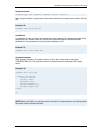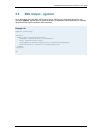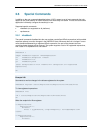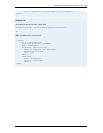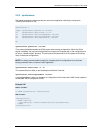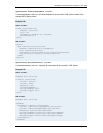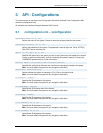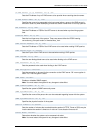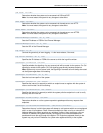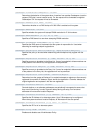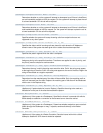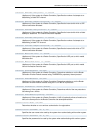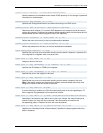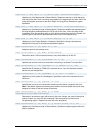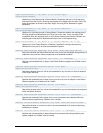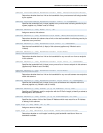
TANDBERG Gatekeeper/Border Controller API User Guide
D14172.01 page 39 of 84
SSH Mode: <On/Off>
Determines whether the system can be accessed via SSH and SCP.
Note: You must restart the system for any changes to take effect.
HTTP Mode: <On/Off>
Determines whether the system can be accessed via the web server over HTTP.
Note: You must restart the system for any changes to take effect.
HTTPS Mode: <On/Off>
Determines whether the system can be accessed via the web server over HTTPS.
Note: You must restart the system for any changes to take effect.
ExternalManager Address: <S: 0, 128>
Sets the IP Address or FQDN of the External Manager.
ExternalManager Path: <S: 0, 255>
Sets the URL of the External Manager.
Log Level: <1..3>
Controls the granularity of event logging. 1 is the least verbose, 3 the most.
Log Server Address: <S: 0, 128>
Specifies the IP Address or FQDN of the server to which the log will be written.
Gatekeeper CallRouted: <On/Off>
Specifies whether the signaling of a non-traversal call will be routed via the system. On: Call
signaling is routed via the system. Off: Call signaling goes directly between endpoints.
Note: Applies only to non-traversal calls; the signaling of traversal calls will always be routed
via the system regardless of this setting.
Gatekeeper LocalPrefix: <S: 0, 60>
Sets the local zone prefix of the system.
Gatekeeper TimeToLive: <60..65534>
Specifies the interval (in seconds) at which an endpoint must re-register with the system in
order to confirm that it is still functioning.
Gatekeeper CallTimeToLive: <60..65534>
Specifies the interval (in seconds) at which the system polls the endpoints in a call to verify
that they are still in the call.
Gatekeeper AutoDiscovery: <On/Off>
Determines whether or not the system responds to gatekeeper discovery requests from
endpoints.
Gatekeeper CallsToUnknownIPAddresses: <Off/Direct/Indirect>
Determines the way in which the system will attempt to call systems which are not registered
with it or one of its neighbors. Direct: Allows an endpoint to make a call to an unknown IP
Address without the system querying any neighbors. Indirect: Upon receiving a call to an
unknown IP Address, the system will query its neighbors for the remote address and if
permitted will route the call through the neighbor. Off: Endpoints registered directly to the
system may only call an IP Address of a system also registered directly to that system.



